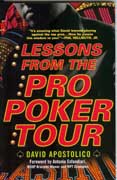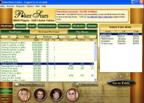
Lessons from the Pro Poker Tour
Don't Talk Too Much When Playing Poker
On my last trip to the Borgata in Atlantic City, I was reminded of that old Run DMC song 'You Talk Too Much.' I wasn’t at all offended by my opponents speaking habits. On the contrary, I David Apostolico is the author of 'Machiavellian Poker Strategy', and 'Tournament Poker and The Art of War,' and his latest title 'Poker Strategies for a Winning Edge in Business.' David's website is www.holdemradio.com/blog/ welcomed their comments as they were giving away more information than they intended. I played in a tournament at the Borgata and there were two hands where my opponents essentially told me what they had.
David Apostolico is the author of 'Machiavellian Poker Strategy', and 'Tournament Poker and The Art of War,' and his latest title 'Poker Strategies for a Winning Edge in Business.' David's website is www.holdemradio.com/blog/ welcomed their comments as they were giving away more information than they intended. I played in a tournament at the Borgata and there were two hands where my opponents essentially told me what they had.
The first hand was very early on and I raised with A-10 from middle position. I was called by both blinds and the flop came A-10-7. Both players checked to me and I fired out a value bet which the small blind called. This player was fairly aggressive so I was a little concerned he was trapping me with a set of sevens. I believe he would have raised pre-flop with a bigger Ace and he would have probably bet out post-flop with a weaker ace. The turn brought a 2 and now he looked at me and asked if I would call if he went all-in. I didn’t answer. He then checked, I bet and he immediately pushed all-in while stating that he goes “all-in with the second best hand.”
Now, I really didn’t know what to make of this. It seemed he really thought he had the best hand and wanted me to call. I didn’t say anything at first as I tried to think this through. The only hands I could see him playing this way were pocket sevens or A-7. I had him covered but not by much. If I called and lost, I would be extremely short stacked. If I folded, I would still have plenty of chips to play with. As I was contemplating, a player not in the hand started talking to him about the hand. He asked how sure he was that he had the second best hand. He then asked him what he thought I had. The player in the hand answered either A-J or A-10. While if he thinks I have A-J, then either one of his possible holdings are good. If he thinks I may have A-10 then only his set of sevens would be good. I asked him if he had a set of sevens and answered emphatically that he did not. Of course, he could be lying but players rather flat out lie like that. They usually say something cute or evasive. Plus, it sounded like he really wanted me to call. I finally concluded that he had to have A-7 and I called.
He did in fact have A-7 and I can only believe that he had to have been convinced that I had a hand like A-J and really wanted a call. However, he made a huge mistake by talking so much. I really might have folded otherwise. The reason being is that I still would have had plenty of chips left and there were so many bad players that it would have been worthwhile to remain in the tournament. The bigger mistake he made is that he didn’t have to risk going all-in. He could have called. Ironically, the river brought another 10 which gave me a full house and counterfeited his 7. Even if he thought I had A-J, he could have gotten away from the hand on the river very easily when the 10 appeared.
The next hand worth mentioning was even more transparent. The blinds were $100-$200 and I raised to $600 under the gun with A-K. I got 4 callers including the big blind. The flop came K-8-4 rainbow. The big blind checked and I bet out $1600. Everyone folded to the big blind who looked at me and said “that’s a huge overbet and he went all-in.” I had him covered with enough chips that it was an easy call on my part. He then turned over K-10 and was shocked to see that I had A-K. He kept asking me why I would make such a huge overbet with that hand. I finally had to point out to him that my bet was not an overbet whatsoever. The pot was $2500 when I bet $1600. That is fairly standard bet. He didn’t seem to understand that the amount of a bet should bear some resemblance to the amount of the pot. He also didn’t realize that he completely gave away his hand by looking at me and announcing that he thought I was on a move with my overbet.
While the above examples were the most extreme, I found that a lot of players spoke way too freely throughout and gave away way too much information. Even if they thought they were being deceptive when they spoke, a good player will see right through it. You are almost always best off not speaking about your hand.

